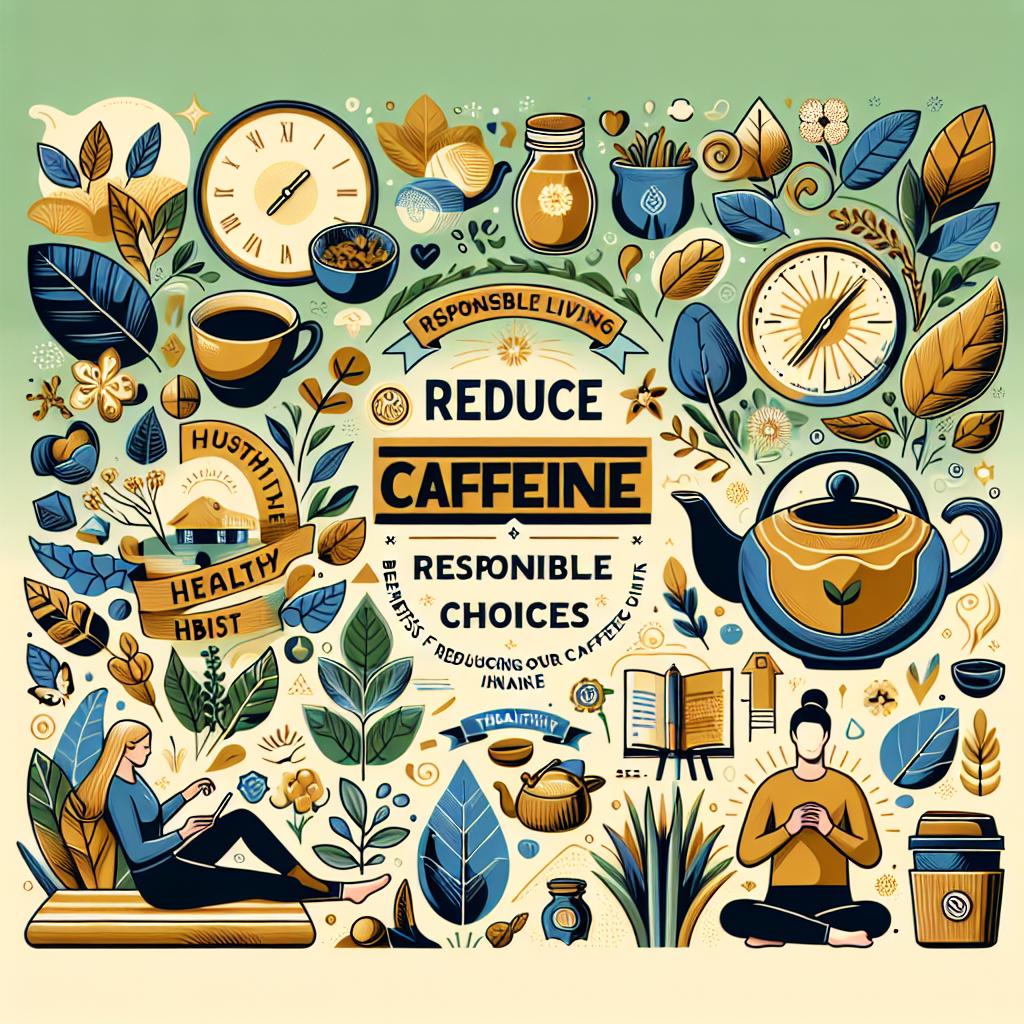The Impact of Caffeine on Your Health
Modern lifestyles often demand a lot from us, sometimes leading to an increased reliance on stimulants like caffeine to keep up with the pace. While caffeine is widely accepted and extensively consumed worldwide in the form of coffee, tea, and energy drinks, the effects of excessive caffeine consumption can be less than favorable. Understanding how to reduce caffeine intake is not just about cutting back on your favorite beverages; it’s about making responsible choices that contribute to long-term health and wellness.
Understanding Caffeine and Its Effects
Caffeine is a natural stimulant that affects the central nervous system, leading to increased alertness and reduced fatigue. However, the effects of caffeine can vary greatly depending on individual sensitivity, the amount consumed, and frequency of consumption. To delve deeper, consider reviewing comprehensive studies from reputable sources such as the National Center for Biotechnology Information which details the pharmacology of caffeine and its physiological impacts.
Top Reasons to Consider Reducing Caffeine
- Improved Sleep Patterns: Caffeine can significantly disrupt sleep by reducing total sleep time and altering the normal sleep stages. Reducing caffeine intake, especially in the latter part of the day, can lead to better quality sleep and more consistent sleep cycles.
- Decreased Anxiety Levels: High amounts of caffeine can exacerbate anxiety symptoms. Lowering your caffeine consumption can help in managing anxiety levels more effectively.
- Better Digestive Health: Caffeine increases stomach acid production which can lead to gastrointestinal discomfort in some individuals. Reducing caffeine can alleviate symptoms of acid reflux and other digestive issues.
- Enhanced Nutrient Absorption: Caffeine can interfere with the absorption of essential nutrients such as iron and calcium. Cutting down on caffeine can improve your body’s ability to absorb these crucial nutrients.
How to Successfully Reduce Caffeine Intake
Reducing your caffeine consumption doesn’t have to be a daunting task. Here are a few practical ways to start making more responsible choices in your daily routine:
- Gradual Reduction: Instead of quitting abruptly, try to cut down your caffeine intake gradually. This can help minimize withdrawal symptoms such as headaches and fatigue.
- Healthier Alternatives: Replace caffeinated drinks with healthier options like herbal teas or caffeine-free beverages. Resources like the Harvard School of Public Health’s guide on healthy drinks provide great insights into nutritious alternatives.
- Mindful Consumption: Pay attention to your caffeine intake throughout the day. Avoid consuming caffeine late in the day or in large amounts to prevent sleep disturbances.
- Stay Hydrated: Sometimes, thirst is mistaken for fatigue. Drinking plenty of water can help you stay alert without the need for caffeine.
For an in-depth perspective, consider exploring how individuals have successfully transitioned to a caffeine-free lifestyle through practical insights and personal stories at Take Charge of Your Health: Embrace a Caffeine-Free Lifestyle.
Transform Your Habits for a Healthier Tomorrow
Embracing a lifestyle with reduced caffeine is not just about eliminating a chemical from your diet—it’s about reshaping your daily practices and enhancing your overall well-being. Making informed and responsible choices today can lead to significant improvements in your health and quality of life. To further understand the ramifications of stimulant use and support available for managing its consumption, resources like Addiction Center can offer valuable guidance.
Committing to healthy habits takes dedication and awareness, but the benefits of reducing your caffeine intake prove it’s worth the effort. You’ll not only enjoy better physical health but also improvements in mental clarity and emotional stability. Start today: make the choice to reduce caffeine and watch as your body thanks you in countless ways!
Nutritional Adjustments to Enhance Caffeine Reduction
Alongside decreasing caffeine consumption, enhancing your overall diet can play a significant role in managing your energy levels and health. Incorporating a balanced diet rich in fruits, vegetables, and whole grains can counterbalance the effects of reduced caffeine, providing natural energy and improving overall well-being.
Nutritional Recommendations
Adapting your diet to support a caffeine reduction regime involves several key elements:
- Increase Magnesium Intake: Increasing foods high in magnesium such as nuts, seeds, and leafy greens can help manage fatigue and improve sleep quality.
- Protein-Rich Foods: Consuming adequate protein from lean meats, fish, and legumes can help sustain energy throughout the day without relying on stimulants.
- Complex Carbohydrates: Opt for whole grains like oats and barley which provide a steady release of energy, reducing the need for caffeine boosts.
For more detailed dietary strategies that align with reducing stimulant reliance, consider reviewing the Dietary Recommendations for Healthy Periods or exploring heart-healthy diets such as the DASH diet from the Mayo Clinic.
Promoting Longevity Through Caffeine Moderation
Reducing caffeine isn’t just about avoiding short-term jitters or sleep disturbances; studies suggest that moderate caffeine use aligns closely with lifestyle practices that promote longevity. Adapting your caffeine intake to moderate levels can be beneficial, providing you with the mild stimulating benefits of caffeine while avoiding its drawbacks.
Linking Dietary Practices with Longevity
Consistent, moderate caffeine consumption coupled with a healthy diet has been seen as a common characteristic among populations known for their longevity. The integration of natural stimulants, such as those found in green tea, along with a diet rich in antioxidants and low in processed foods, supports both mental and physical health.
To further understand how lifestyle habits influence health and lifespan, I suggest reading about the 13 Habits Linked to a Long Life, which provides insight into the various factors contributing to increased life expectancy.
Exploring the Role of Exercise in Reducing Caffeine Dependence
Physical activity is another excellent substitute for caffeine. Regular exercise releases endorphins, often known as the ‘feel-good’ hormones, which naturally boost your mood and energy levels, reducing the need for artificial stimulants like caffeine.
Exercise Recommendations
- Cardiovascular Activities: Engage in activities like walking, cycling, or swimming to increase heart rate and improve endurance.
- Strength Training: Incorporating weight training or resistance exercises can help build muscle, boost metabolism, and increase energy levels.
- Mind-Body Exercises: Practices such as yoga or tai chi not only reduce stress but also enhance overall energy management and balance.
Incorporating these exercises into your daily routine can significantly diminish the reliance on caffeine by stabilizing energy levels and improving mental clarity. For recommendations on integrating exercise into your daily lifestyle, consider resources from The Women’s on Exercise and Diet.
Fertility Benefits of Caffeine Reduction
For individuals looking at pregnancy or improving reproductive health, reducing caffeine can play a crucial role. Increased caffeine intake has been linked to fertility issues in some studies.
Impact on Female Fertility
Excessive caffeine consumption can affect female fertility by influencing hormone levels and menstrual cycle regularity. For those planning a pregnancy or addressing fertility challenges, limiting caffeine is advisable. Detailed information on this can be found in the Mayo Clinic’s article on female fertility.
Conclusion
Reducing caffeine intake offers numerous benefits that extend beyond mere avoidance of its negative side effects. From improving sleep quality and digestive health to enhancing nutrient absorption and mental well-being, the advantages are substantial. Engagement in a healthy lifestyle that includes moderate caffeine consumption, balanced nutrition, regular physical activity, and mindfulness practices lays a strong foundation for improved health and longevity.

